7 Best Google Sheets Workout Templates

We’ve hand-picked the best Google Sheets workout templates available. You’ll find them organized into categories, based on the fitness goals you need.
Whenever you’re starting a new workout regimen, it can feel complicated. Remembering how far you ran or how much weight you lifted on specific gym machines isn’t easy. There are plenty of fitness apps that can sometimes help with this. However, many of those are preloaded with exercises or workouts you may never actually do or missing the ones you want.
With Google Sheets, you can customize a workout that fits your goals perfectly. Include only the exercises and workouts you need, and remove everything you don’t. Thankfully, you don’t have to start from scratch. There are plenty of Google Sheets workout templates available online to help you get started.
In this article, we’ve hand-picked the best Google Sheets workout templates available. You’ll find these organized into categories based on the type of fitness goals you’re focused on. Just scroll to the section that matches your needs, and choose the right template for you.
Google Sheets Running Workout Templates
Runners like to log their runs in different ways. Many runners are pleased just logging mileage and time. Other runners prefer to log everything from average pace, run difficulty and even notes on how they felt during the run.
LogRun
LogRun is a Google Sheets running log template created by Mike Kasberg. It’s a middle-of-the-road Google Sheets workout template that includes the most important aspects of your run.
Note: As with all other Google Sheets workout templates listed in this article, you can’t use the original. If you like the template, select File and select Make a copy.
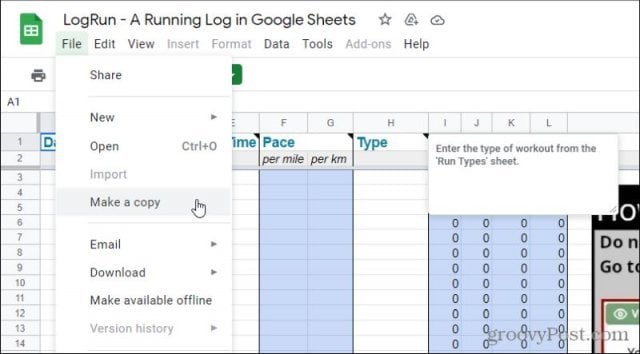

Save the file in a folder in your Google Sheets account, and give it any name you like. In this particular template, you’ll see a pop-up window advising you not to use the original. Select this box (in the copy you saved to your own account) and press Delete on your keyboard to remove it.
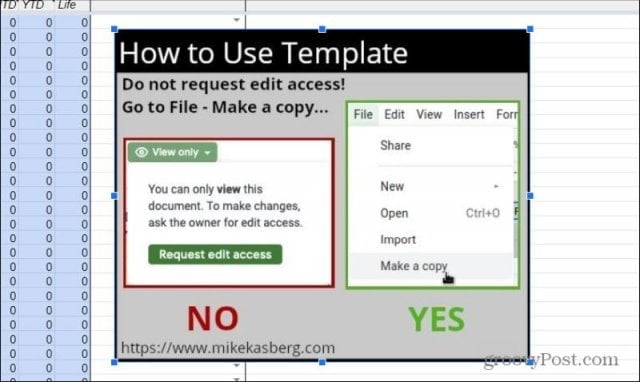

As mentioned above, LogRun includes the main characteristics of a run that most runners like to track. This includes:
- Date and day of the week
- Distance ran and overall time
- Average pace
- Type of run (easy, hard, hill, etc.)
- The running shoe you were wearing
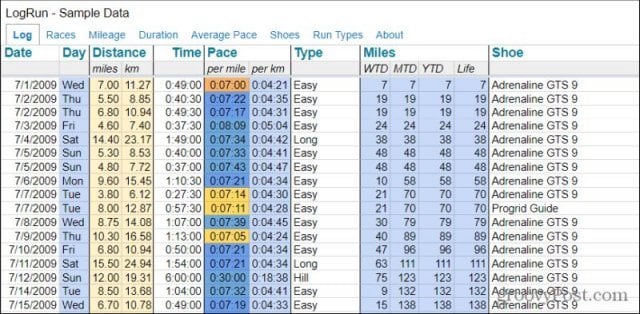

The Miles columns will fill out automatically, showing you the accumulated miles you’ve run this week, month, year, and since you started logging (Life).
Click through the tabs of this spreadsheet to see all of the visuals Mike has created for you. You’ll see tabs that summarize mileage, pace, race types, and more.
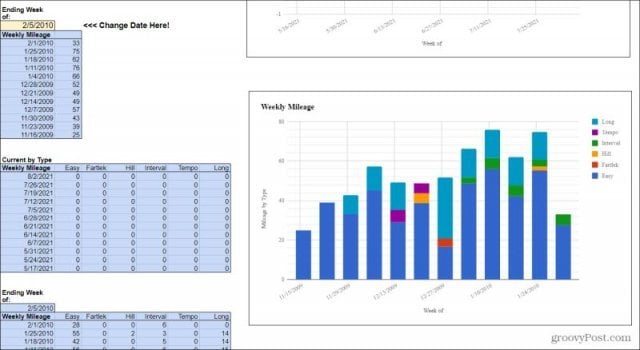

This is one of the best workout templates for running because you can open it up in your mobile Google Sheets app. The entries are simple and quick to make.
Marathon Training schedule
Marathon Training Schedule is tailored for runners who are training for a marathon. It’s a 10-week training log where you can quickly type the distance and the type of run you had on that day.
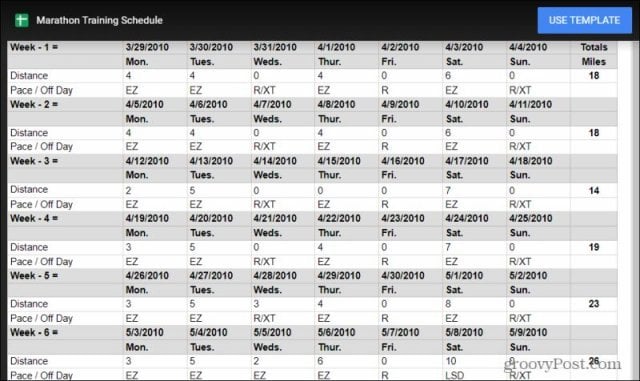

If you’re not sure what codes to use, select the Constants and Legend tab to see what all of the acronyms in the sample spreadsheet mean.
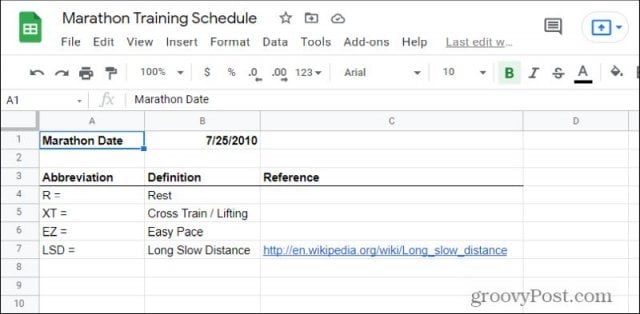

You can use these or create codes of your own. As you can see, you can also use a code to capture minutes spent doing non-running activities, like lifting or cross-training.
High Detail Running Log
A 2014 running log posted by a runner on Reddit is probably one of the most extensive Google Sheet workout templates you’ll find anywhere.
It lets you track a long list of details around your run. On the first half of the sheet, you’ll find the following details you can track:
- Date and day of the week (including time)
- Type of run (long, easy, interval, etc.)
- The description of the run is in free text form.

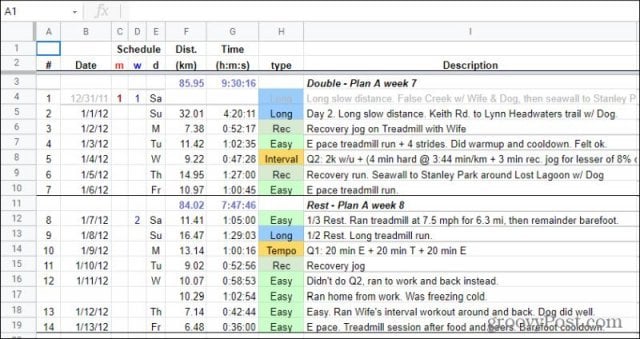
If you scroll to the right, you’ll see the other half of the spreadsheet includes:
- Pace and distance
- Type of shoes you wore
- Additional free form comments that you want to add about the run
- A link to your Garmin activity page for that run (if you have one)
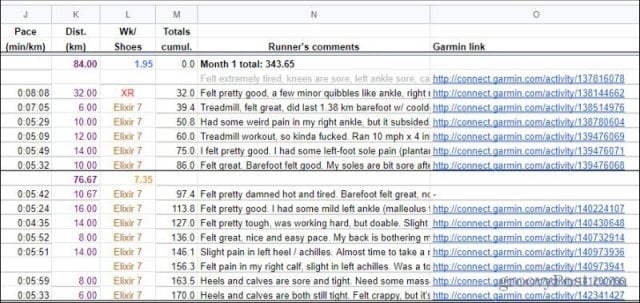

The cumulative total column (from the beginning of your log) will update automatically in each row.
Select the Summary tab to see all of your cumulative totals for each week. You can also add additional notes about injuries, specific races you ran, and more.
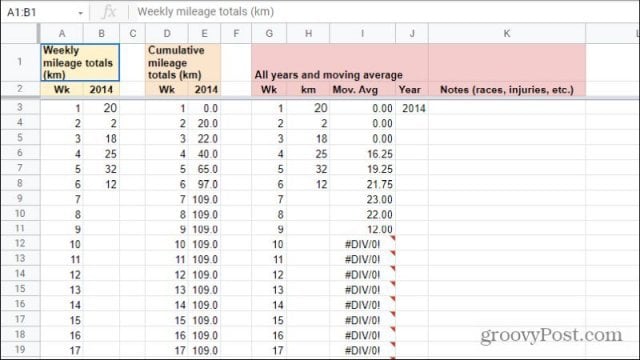

The Weekly and Cumulative tabs will show you your progress over time in a line graph format.
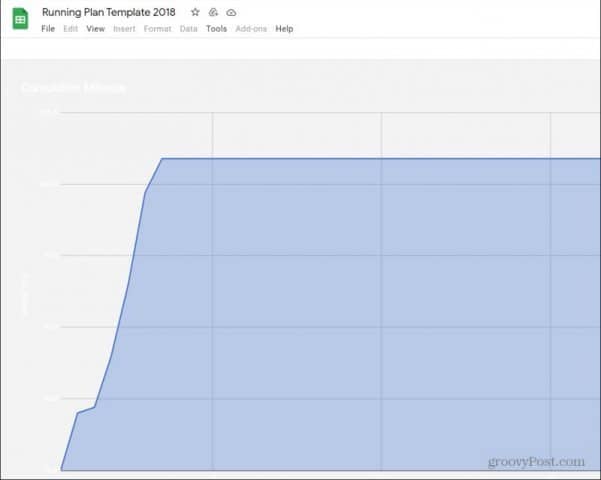

Data Miles Template
If you’re more of a minimalist with your running logs, you’ll love the Data Miles Google Sheets template.
In this log, all you need to log is the date, distance, and time you’ve run on any particular day. The sheet will do the rest of the work.
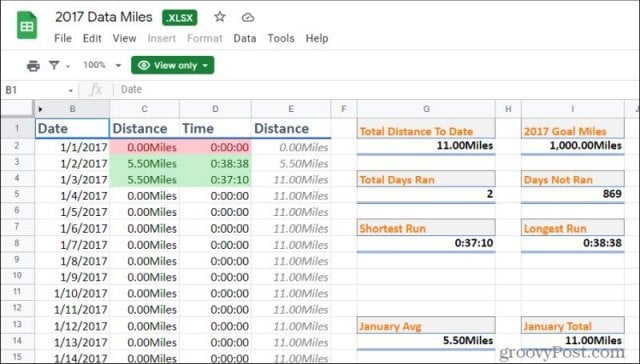

The second Distance column will automatically show you the cumulative total miles you’ve run since starting your log.
If you scroll to the right side of the sheet, you’ll see boxes with many other statistics as well.
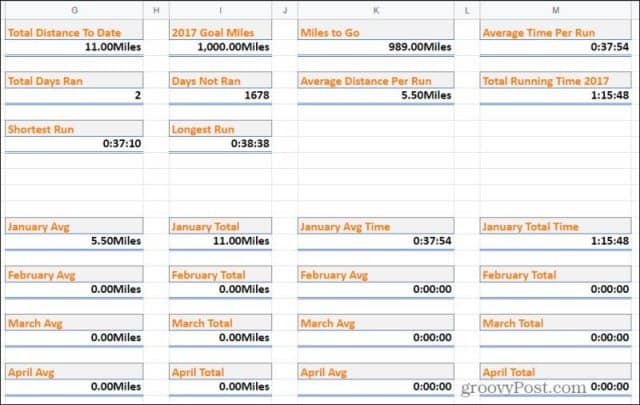

These include miles toward your goal for the year (if you’ve entered one in cell I2), average distance per run, shortest and longest run, and more. You’ll also see your monthly total running time and mileage in the lower half of the sheet.
Google Sheets Weightlifting Workout Templates
If your workout regimen involves lifting weights more than running or cardio, you’re going to need a good log. A weightlifting log can help you track your progress with how much weight you can lift without having to use your memory every time you approach the lifting machine or free weights.
Weight Training Workout
One of the most popular Google Sheets weightlifting log templates is titled Weight Training Workout.
This workout template has an immaculate, organized entry sheet. It is focused on logging three sets that include three different exercises each. This log is best for people who like to work out all muscle groups a couple of days a week.
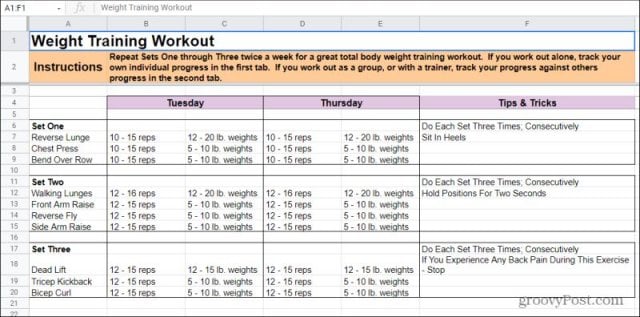

Just enter the set of lifting exercises you want to do under the three-set headings. For each of the two days of the week, type the number of reps you want to do and your current weight targets. Repeat this process for each exercise. There’s also a Tips & Tricks field where you can give yourself notes on your technique, breathing, and more.
Select the Track Your Individual Progress tab; you can log general information about each overall workout. This includes rest days, so you can also describe how you felt on that particular rest day. This can give you a lot of feedback on whether what you’ve done in the gym is having the intended effect. It can also give you early hints about whether you may be doing too much and potentially causing long-term injury.
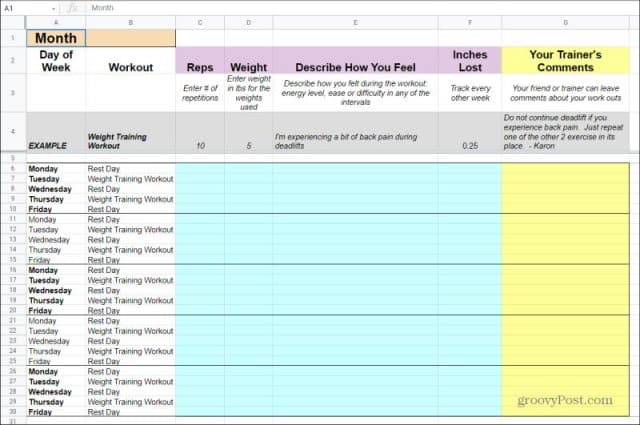

There’s also an Inches Lost field where you can log your health and fitness progress by measuring the inches around your waist. You could use this field to enter fat caliper entries for your three key body fat measurements if you wanted to.
Workout Log – Vertex42
If you’re more of a minimalist when it comes to weightlifting logs, you’re going to love the Workout Log from Vertex42.
The idea with this log is that you’ll use this sheet every month. The log includes room to track four weeks at a time. You can either print this log and use a paper copy at the gym or call it up on your mobile phone and enter the details as you’re working out.
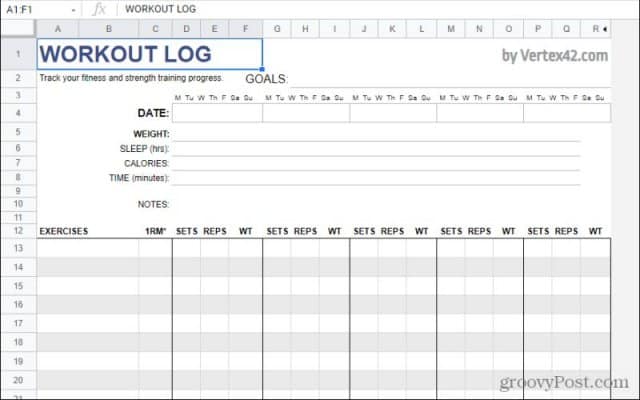

Each month, you’ll fill out the header section with the date of the start of the week, current weight, average hours of sleep you’re getting, average calories you consume, and overall exercise time.
Each row has room for an individual exercise and up to five sets. You can log the number of reps and total weight you lifted for each set or include an average for one entry per line. How you use this workout template is completely up to you.
As always, Vertex42 also provides a help tab with tips and guidance for properly using the template.
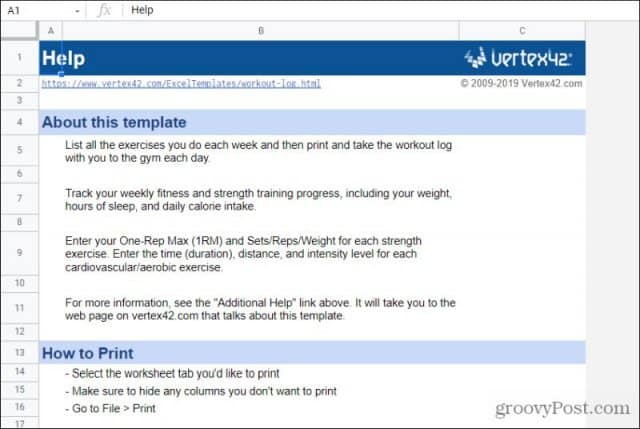

The Kevin VanDriel Workout Log
This Google Sheets workout template originated from BodyBuilding.com and is based on the workout regimen used by lifter Kevin VanDriel.
This template is more of a freeform design. In the left field, you can add quick notes for yourself to read before exercising. The second field is where you’ll either follow VanDriel’s month-by-month routine or convert it to your own.
Each block is a month with a grey header identifying the category (aerobic or weight), and under this are the individual exercises like squats, barbell benches, etc. This column is also where you’ll list the sets and number of reps under each exercise.
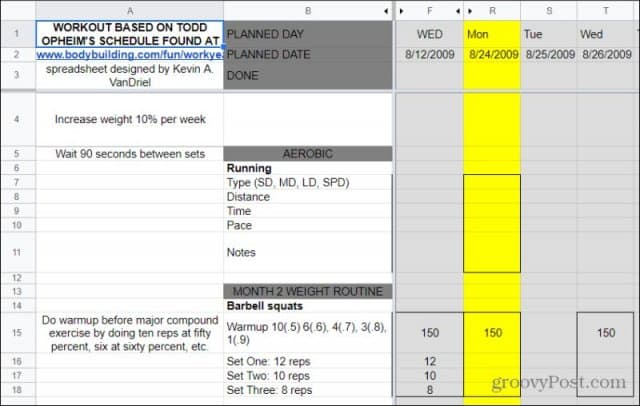

The columns in the grey area to the right are where you’ll log the specific weights you lifted during each set. This layout gives you a glance look at your weight progress. It’s also an easy way to see your last weight levels the next time you’re in the gym and feel like you’d like to elevate a little.
Each month, you’ll create a new tab and start tracking all over again.
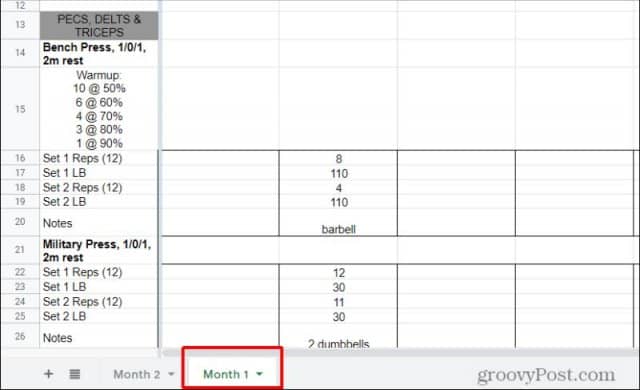

You may consider bringing over the last set of weights so that you can continue viewing and adjusting your progress each month.
Customizing Your Workout Templates
As you can see, there are lots of options if you want to use Google Sheets to log your progress as you work out. The template you choose really depends on what your workout regimen looks like and how you’d like to log your progress specifically.
The key is to choose one and then stick with it as you continue making gains and improving your overall health and fitness.
Leave a Reply
Leave a Reply
